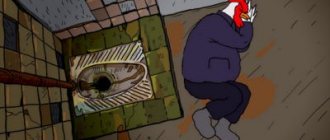Gulagu.net has at its disposal a large video archive of the Federal Penitentiary Service, containing videos of rape and torture of prisoners. According to the founder of the project, Vladimir Osechkin, “this proves that in the institutions of the FSIN there are Sonderkommandos of secret agents of the FSB and the FSIN, who, on the instructions of their curators, torture and rape prisoners, and the process itself is filmed on office video recorders, which they are given to film these tortures.” With the help of this incriminating evidence, people are forced to sign statements and cooperate with operatives.
Judging by the video recordings that “That's So” has at its disposal, prisoners are tied to beds with their legs and buttocks raised up. In some cases, a gag is inserted into the mouth, in others they simply cover the mouth and play music somewhere in the background. After this, the tied ones are raped. Sometimes a certain man tries to do this, whose face is not included in the frame. In other cases, a mop wrapped in tape or something similar is screwed into the anus in a spiral. Then the raped person is asked if he understood everything.
We are publishing the recording of the torture because we consider it to be socially significant evidence, but we warn you that the video may shock you.
According to Vladimir Osechkin , FSIN operatives made such video recordings for reporting to higher authorities, up to the generals.
“Gulagu.net has obtained new evidence that proves the systemic nature of torture and the involvement of employees of the State Institution of the Federal Penitentiary Service of Russia and the operational departments of the Main Directorate of the Federal Penitentiary Service for the Irkutsk Region, the Department of the Federal Penitentiary Service for the Saratov Region and the Department of the Federal Penitentiary Service for the Vladimir Region in these massive violent crimes.
We have at our disposal a number of files from the official video archive of the Federal Penitentiary Service, filmed on official video recorders in the period 2018–2020, which indicate that the FSIN operatives, obliged to identify and suppress crimes, actually instructed their agents from among the recruited convicts to torture, torment and to rape those under investigation and arrest, defendants and convicts, as well as to film these tortures and sodomy on the official video recorders of the Federal Penitentiary Service in order to collect incriminating evidence and subsequent blackmail of the victim of torture and, under the threat of discredit and transfer to the caste of the humiliated (the so-called downtrodden), hundreds of people were forced to “cooperation,” signing contracts to work as an in-camera agent (informer), to “cooperating with the investigation,” and signing testimony prepared by investigators that is convenient for investigators and clients,” says Osechkin.
Story
“Kobly”: how they appeared in women’s zones of the USSR
In women's prisons and camps, life and human relationships are completely different than in men's correctional institutions. In the cells of the pre-trial detention center, everything is run by the elders - prisoners appointed by the administration. In the zones, active lesbians have the greatest influence. And it’s no secret that in women’s colonies it is representatives of non-traditional sexual orientation who most often start fights.
A woman who has taken on the role of a man is called a male in the zone. She formally plays the role of husband. As in the wild, in the camp for women the family remains in the foreground, so in the zones the prisoners mostly live in families, both figuratively and literally. Active camp lesbians always take male names, cut their hair short, and try to speak in a deep voice. They even outwardly become similar to men: their gait changes, their facial features become coarser.
The male dog takes on the role of protector and breadwinner (for example, she must get or buy some food), and the duties of a housewife are performed by a passive lesbian, she cooks and sets the table. The latter in places of deprivation of liberty often get tattoos depicting either a mermaid in a crown, holding a violin and bow in her hands and splashing on the waves, or rescuing a girl drowning in a stormy sea. Such unions usually last throughout the entire period of imprisonment, and the separation of the couple is not encouraged.
This connection is determined not only by sexual demands, but also by the desire, for example, to have moral protection. There is no courtship in such couples. Everything is restrained and dry. By the way, no one rapes anyone - everything happens by mutual consent. Paradoxically, the most violent, bloody showdowns, sometimes with fatal results, occur precisely in the women’s colonies of the post-Soviet space and mainly because of the jealousy of cobles.
If in men's prisons violence usually comes from guards, then in women's prisons violence more often comes from cellmates, with the tacit consent of the prison administration. Fights break out, as a rule, over trifles, and they can be much more severe than among men - nails, teeth and other attributes of female beauty come into play. Women, apparently, are so keen on sorting out relationships among themselves that they find themselves completely ununited in the face of a common misfortune. Many experts believe that the origins of camp unions lie in colonies for juvenile delinquents, where girls also often create husband-wife couples.
Cobles in prison: how do they become one?
Every day I watched as my cellmate turned into a kobla. Those who have seen films with the Hulk can visually imagine my story about the transformation of a person (woman) into THIS.
She called herself Panther (the prison nickname has been changed).
Two months before I was transferred to her cell, we first met her in the prison sump (a waiting room for prisoners before going to court).
A tall brunette with long, tarry hair down to her waist, she was smartly dressed in a white mink coat. With her tenacious and piercing gaze, she measured me from head to toe.
“My name is Panther, they closed at 162. Identify yourself!” - She introduced herself to me in an orderly tone.
Besides her, there were five other prisoners in the detention center, all of them were tense and looked ingratiatingly at the Panther.
I was in no hurry to voice myself and the article, since I had already seen more than once that after announcing myself, most women began to shy away from me.
Ignoring the question of this “lady in a coat,” I asked the other women about their articles of the criminal code.
Out of the corner of my eye, I noticed that the Panther’s face expressed dissatisfaction at my ignoring.
When everyone introduced themselves, I announced myself and my “thieves’ article in prison” - 318 of the Criminal Code of the Russian Federation.
The panther's face changed and immediately lost interest in me. The rest of the women, ignoring the anecdotes of “White Manto,” questioned me on the matter.
The panther lit a cigarette offendedly, squatted down like a man and, between puffs of smoke, spat on the floor at his feet.
Two months later, I was transferred to her cell while the cell for non-smoking first-timers was to be repaired.
The woman who met me in this cell and was the eldest in the house no longer resembled that long-haired Panther in a white mink coat.
His hair was cut short, his jeans were cut off to match shorts, and he wore a men's T-shirt with no bra underneath. It was as if I was greeted by a half-man. At that time I didn’t know about cobbles yet.
In this prison photo from the Internet, the male looks very much like the Panther I'm talking about. She looked exactly the same.
I only spent a week in the cell with this Panther. But every day I watched her become aggressive and turn into a bully.
Her habits, tone of voice, gait all became similar to a man’s.
One day, when Panther went into the toilet, the door opened, and we saw with the whole camera that she was peeing while standing.
Research psychiatrists claim that in most cases, cobles in prison come from among lesbians. But they do not deny the fact that a woman who is an athlete or someone who has constantly engaged in hard physical labor can become a coblem.
If we consider the case of the male Panther, then she was a florist entrepreneur when she was free. I personally grew flower seedlings in huge greenhouses. Sometimes she was helped by her weak-willed husband (according to Panther) and her young daughter.
When Panther was arrested for robbery from a competitor, her husband realized that she would not be released before 6 years - he divorced Panther and immediately married her godfather friend.
Perhaps, in addition to hard physical labor, the psychological shock from her husband’s betrayal pushed Panther to become a cobbler?
Free life
Upon release, Olga was met by Natalya. The couple settled in her grandmother’s apartment, which was looked after by her uncle, her only close relative, in Olga’s absence. The housing is municipal, she is registered there, so he couldn’t do anything with the apartment. True, he took everything out of there, leaving only the piano and ottoman given by his father. “But I had a library and home recording; one microphone cost 8,000 rubles! It’s a pity, of course,” Olga complains. “While I was sitting, my uncle was renting out an apartment and from time to time he sent me parcels according to the list. We had purely market relations with him.”
The first thing the women did was get a cat, then a cat and a dog. Through friends, Olga got a job as a cashier in a store. She worked there for about a year, then the management changed and she left. When a self-isolation regime was introduced in Moscow due to the pandemic, Olga joined the labor exchange and received 5,000 rubles a month—only enough for utilities. Then she worked as an administrator for sushi delivery for several months, until the store closed. She has been unemployed since March and lives off Natalya. “All the time since my release, I worked unofficially. Large retail chains do not accept people with a criminal record. 10 years ago I was convicted of drug charges - I was wrong, it happens to everyone! This does not mean that I am currently using. And before my arrest, I had only been using for a couple of months and was immediately caught.”
Olga does not hide her criminal record: “It would be unpleasant if my employer found out about this from someone else. It’s easier to say it yourself.” Unscrupulous employers take advantage of this. Once Olga and her partner were not paid for preparing the apartment for renovation. The customer said that a box was missing from the apartment, and until it is found, there will be no money. Soon Olga will start a new part-time job, but “it’s also not a fact that they will pay.” She dreams of a musical career, but understands: “To get promoted, you need to sing something like Buzova or Instasamka.” And she is horrified by modern Russian pop music.
“I have a feeling that these eight years in the colony never happened, but that’s my character - always positive. “I enjoy silence and solitude, I often go for walks in the forest,” says Olga. “I know that some girls, once released, do not leave the house for several months, they are afraid that something will happen and they will end up in a colony again. This didn't happen to me. Only one phobia has appeared: I’m afraid of high-rise buildings - I lost the habit of them in the colony - it seems that they will fall on me.”
Life in a women's cell
Unlike men, female prisoners do not have “authorities”; living according to “concepts” is not typical for them. The organization of relations in the cell is built rather on the principle of “hazing,” i.e. Those who have served longer have more advantages over newcomers.
Here, for example, is a diagram of the distribution of sleeping space. In addition to the bunk beds, there are four separate beds that stand apart. This most privileged “site” is called a “glade”. As a rule, the cell eldest and her trusted persons or simply “elders” can sleep there.
The remaining seats are also distributed according to seniority: new arrivals are located near the aisle or near the toilet, women with “experience” occupy more comfortable beds as soon as they are free. The new girl must be content with what remains.
Basically, prisoners are focused on maintaining their own minimum comfort. This principle is also common in the wild, but in cramped spaces it manifests itself more sharply.
Over time, the understanding comes that it is more difficult to cope with everyday inconveniences alone, and in order to find at least some support, women unite in “families”, groups of two or three people.
Within the “family” it is customary to share food and basic necessities. There were cases when women had to consolidate in order to achieve an improvement in the conditions of detention common to all, and to demand certain concessions. It is almost impossible to achieve this with small, isolated forces.
By the way, in women’s prisons the situation with tuberculosis is much better controlled and there is less chance of contracting it than in men’s prisons.
She is ordered to collect her numerous things, as well as those just received from the outside, and with all this heavy belongings, weighing about 50 kg in total. she begins to move from cell to cell, from floor to floor.
Another way to put pressure on a prisoner is to punish fellow inmates. The reaction of many, taking into account different ages and positions, can be unpredictable.
They cooperate mainly because of concessions from the regime, because of the need for certain things, and also out of fear. The information obtained from the “informers” is used in the case of the desired prisoner, while the source of the information is not disclosed. It is impossible to imagine something like this in men.
For male prisoners, life revolves around one or another “authority,” thanks to which the team becomes united, and the administration has to take this into account. It costs nothing for the “authority” to use the prison mail (“dear”) to stir up or calm down all the cells.
There is no such coordination among women in a team, which means that any one individual is easy prey for the manipulation of operatives.
As if the main thing in this natural moment of life is not the holy of holies - the birth of a child, even if a woman has stumbled, but the moral side of the issue. Where, in fact, specific actions are required for the successful bearing, birth and further upbringing of a child, the standard, at a minimum, is neglect.
The day after birth, a baby born without complications is sent from the maternity hospital along with the mother to her place of permanent residence. If we are talking about a correctional colony, then the child is placed in the Children's Home at the prison. The woman’s life continues to go the same way as the rest of the prisoners; in her free time from work, she can visit the baby.
The child's stay in the prison Children's Home is designed for three years. If the mother has only a short period of time left to serve her sentence, she may be left for up to 4 years. If the term of imprisonment is long, the child is transferred to an orphanage. The likelihood of a mother meeting her child in the future is very low. But there are also exceptions.
So it has developed in our country that those who come from places not so remote are no longer perceived as people in society, despite the nature of their criminal record, actual guilt, etc. Nobody will deal with these subtleties. Former prisoners and convicts who have already lost their socialization and have not received support in society naturally slide down the same criminal path. What kind of children are there...
“A carefully organized torture conveyor” Stories of people who served their sentences in OTB-1 of Saratov
18.09.2021 15:24
“We managed to remove from Russia and the CIS a man who had been serving a sentence for five years in one of the FSIN institutions. He is a programmer, he himself was beaten and tortured, and then they decided to use him as a professional,” Osechkin told the “That’s So” correspondent. – For five years, he had access to FSIN computers and video recorders at the OTB-1 security headquarters in Saratov.
The torture room in the local tuberculosis hospital operates under an agreement with the FSB; prisoners from all over the country can be transferred there formally for medical reasons. There are four categories of arrestees and prisoners who were beaten and raped there: if he is interested in testifying against a prominent opposition leader, billionaire, or major official; to subjugate any observer or position - so that he fulfills any whim of the operative. Even with extortion, how rich is this man? And by order from the outside: if enemies at large paid operatives 3-5 million rubles for organizing a rape on camera.”
Analysis
Prison life in a women's colony
In prison, a woman has little opportunity to defend her rights, while the pressure from the administration is enormous. Almost everyone works, it makes time pass faster, and the extra money doesn’t hurt.
The prison store has a limited selection and is often overpriced. The lack of quality food quickly affects the health of prisoners. Losing teeth and losing your stomach is elementary. You can only count on transfers from relatives, but it is not a fact that they will fall into your hands in the proper form. There is no use in complaining; letters and calls are read and listened to.
There is plenty of work in the zone. The main work is sewing. The sewing factory is located in a hangar, in which machines stand one after another. Each performs its own operation within the framework of the general order. If for some reason you cannot cope with your work, then you slow down all the work. Accordingly, no one will understand and help you. Instead, swearing and punches are expected. Being under stress, as a rule, many still quickly master the necessary operation.
Some prisoners are sent to work related to servicing the zone. For example, to the technical control department, where products are checked for defects. Carpenters, librarians, mechanics, foremen - these are the places where women from the garment factory strive to get. Not many people can stand the monotonous sewing work.
A number of positions are reserved exclusively for people with higher education, for example, in the social security department. Often, FSIN employees are not able to cope with their work due to lack of knowledge and experience. In such cases, all the work is done for them by competent prisoners for a meager part-time salary and, again, for loyalty. The FSIN officers themselves receive their salaries as expected. That is why “smart” prisoners are so valuable to them, and that is why they are so rarely released on parole.
Thus, years pass in the struggle to minimize discomfort in prison conditions. For some, a couple of years, for others, dozens. Man is designed in such a way that he gets used to any existence, even an unbearable one, but at the same time he lives in hope for the best. And it seems that the best is behind bars. And at the end it turns out that the difficulties do not end, but a new round of them begins.
“They communicate with you as long as you have something to share”
Olga was transferred to correctional colony No. 6, which is located in the Oryol region. “At that time, our colony was exemplary; television crews came there periodically, so in terms of living conditions, life was tolerable. But only if there are no serious health problems—medical care in the zone is poor,” she recalls.
Olga immediately set herself the goal of getting out on parole. At first it was very difficult for her to live according to the regime. Getting up at six in the morning, “if the duty officer comes in and you’re still lying down, they’ll write a report on you - and goodbye to parole,” exercise at 6:15, then breakfast, at 7:30 - line-up and departure to work - sewing production.
The shift lasted eight hours, but Olga tried and could work for 24 hours.
She earned, according to her, about 20 thousand in cash - she spent it mainly on cigarettes and Rollton. Among the prisoners there were also those who received literally 10 rubles a month: they came to sewing - it was impossible not to come - but did not work. “It is important to the administration that prisoners meet and exceed the plan,” she explains. — Previously, we sewed 6,000 sets of clothes a month (now, as far as I know, they can’t sew 1,000). If the team sees that you are working and trying, they will support you, but if you send everyone and don’t want to work, they will oppress you. Nobody wants problems, everyone wants to get out on parole.” In 2013, Pussy Riot member Nadezhda Tolokonnikova, serving a sentence in IK-14 in Mordovia, wrote an open letter in which she spoke about the abuse and slave labor of women in the colony. However, a criminal case about abuses in the Mordovian colony was opened only five years later - in 2018. In July 2022, the court sentenced the former acting
the head of the colony, Yuri Kupriyanov, to two years probation for exceeding official powers. Olga recalls that in the colony women always tried to take care of themselves: “Sometimes you just put on makeup to spite the guards on duty, who look down on you. All prisoners are given sizeless clothing. We tried to fit him according to his figure.” This violation is subject to a report, but the administration punished only for an excessively shortened skirt.
“The women’s colony is essentially a big chicken coop. I couldn't find real friends there. The women there “have a family life,” that is, they share food and cigarettes, which they receive from the outside in parcels. But I don’t like this bag system, because they communicate with you as long as you have something to share. For example, a mother constantly brought parcels for one girl. They were friends with her. When my mother died, all the “friends” turned away because they realized that there was nothing more to take from her.”
There were also romances between women in the colony, but there were few strong couples. “I saw enough for the first two years: today - with one, tomorrow - with another, they come together, then they separate, and when they are released, they forget all their vows, find men and give birth to them,” says Olga. There were also fights out of jealousy, but rarely. The convicts were quickly separated - otherwise, report, you won’t be released early.
In 2014, Natalya came to the colony. They were in different squads, but sat opposite each other while working. We just talked for six months, “and then things started to happen.” Now they have been together for six years. Natalya was released on parole a week earlier than Olga.
Same-sex sex is prohibited in the zone ( According to
Article 116 of the Penal Code of the Russian Federation , “lesbianism” is a malicious violation - “Utopia.”
). If they catch you, they can put you in a punishment cell and write a report - then you definitely won’t be released on parole. But, according to Olga, when the administration sees that the couple does not scandal, does not sort things out and, most importantly, works well, they turn a blind eye to this. “Natasha and I were in different detachments and sometimes during the day we came to each other, curtained the two-tiered curtain wall on all sides with sheets, and... We tried to do everything quietly and quickly, so as not to catch the eye of the duty officer and the head of the detachment.” Such openness did not bother Olga: for the first couple of years she slept on the second tier, above the married couple.
“In a colony you are constantly visible. I really lack personal space. The only thing you dream about is to be alone. For three years you are still somehow holding on. Then you get tired, become aggressive, lose your temper, and ask them not to come near you again,” she recalls. “Since there was no physical opportunity to be alone, I simply retreated into myself.” The woman’s outlet was the club at the colony, where she went to sing: “I wouldn’t have survived without music.” Olga even ended up in a news story on a local TV channel. A few years later, she was appointed head of the club and transferred to a lightweight squad. There, instead of two-tier bunks, there are single-tier bunks, a larger rest room, a spacious kitchen with a microwave, a washing machine and a shower for the squad (instead of a common bathhouse) - that is, the conditions are much more comfortable.
Illustrations: Nastya Krzysztof/Utopia
Olga first applied for parole after five and a half years in prison. She says that she tried very hard, she had no violations, only one single reprimand for not meeting production standards - and that was not her fault. But the girl was denied parole, and this was a strong blow for her. I realized that if you sew very well, you won’t get parole: it’s not profitable for the administration to release good seamstresses ahead of schedule. After this, Olga “stopped trying and lived as she wanted until the end of her sentence.”
Stage to the women's colony
As soon as a document arrives confirming that the verdict has entered into legal force, the woman is notified to pack her things. Nobody tells her where they are sending her, how long the journey will take, or what to take with her. A new period begins, painful in its uncertainty.
With her things, the woman goes to the “assembly”, a place where prisoners gather for departure, each in their own direction. A paddy wagon arrives and takes them to the station. There the women are transferred to the “Stolypin” carriage. The carriage is hooked to the train and off we go.
Throughout the journey, roll call takes place several times a day, women are constantly searched for prohibited items, they repeatedly have to undress and put on clothes again, empty the contents of their bags, which immediately need to be collected immediately.
Women's zone: who are cobbles and pickers?
New arrivals at the zone are greeted with a medical examination and given clothes to wear for the entire term. Now, upon request, a woman is obliged to state her last name, first name, patronymic, year of birth, article and term of serving the sentence.
Until 2003, women in the zone only partially adhered to the “concepts.” They did not like informers and punished them in every possible way; it was shameful to cooperate with the administration. After 2003 the situation changed. They began to approach the administration not so much with substantive complaints, but also with ordinary denunciations, thereby earning themselves encouragement.
The informers began to be protected by the colony staff; minor violations, to which the authorities simply turned a blind eye, were acceptable.
Just like in a pre-trial detention center, in prison they live in “families”; it’s easier to organize everyday life, and close communication brightens up the prisoner’s drab life. The consequences of such habitual, almost familial, communication are noticeably noticeable when someone from the “family” is released into the wild. It is difficult for those who remain to start all over again.
“Family” does not always imply a love affair, but there are such cases. Same-sex relationships are quite common among women in the colony. These are called cobbles and pickers.
You can find a separate article about them on our website. In some prisons, the administration deliberately actively supports such couples, again not with the best intentions, but in order to manipulate, forcing one of the partners to influence their other half.
It is worth noting that in men's colonies the attitude towards homosexuality is the opposite, negative. Gays are classified as a lower caste, given the dirtiest work and banned from a seat at the common table.
A separate topic worth discussing is the situation of pregnant women and women who gave birth in prison. Today, the attitude towards this vulnerable category of prisoners has changed somewhat, but notes of condemnation of “unlucky mothers” are still present.
Loss of social skills and fear of will
People in the colony, according to experts, lose social skills within three to four years. The world is changing very quickly, so it is more difficult for a woman sentenced to even a short term to adapt to freedom. She becomes an easy prey for scammers because she is poorly oriented in the new world.
“I am working with a woman who was released after eight years in prison. It’s unusual for her that now a lot can be done via the Internet. For example, to get a certificate, you just need to go to the State Services website. Now she is learning to work with online services that did not exist a few years ago. Of course, this is stressful for her,” says Elena Efimova, a social worker at the interregional public organization Doctors for Children. This leads to another problem - fear of will. She regularly hears from those who have been released: “It would be better if they returned me back. It was easier in the colony.” Recently, Efimova invited her ward to get a job at a shelter, since she did not have her own place to live, but she refused - she did not want to live according to the regime and rules again. “This woman has just been released. After a month or two, she may realize that she does not know how to handle the freedom that has fallen on her.”
More on the topic
“With a huge belly, in handcuffs, with five guards nearby.” How children are given birth and raised behind bars
One of the main problems of those released, according to the social worker, is the loss of independence. “Prisoners live not only according to the regime, but also according to orders: what the boss said, you do. It doesn’t matter whether it is necessary or not, whether it coincides with your desires and needs - there is an order, and it must be fulfilled. Because of this helplessness, a person has a very hard time in the wild. For example, problems arise with employment. Former prisoners are already reluctant to be hired, but they themselves have forgotten how to work of their own free will - only on orders.”
Experts note that it is easier for women who are expected at home to adapt and get back on their feet. Therefore, working with the families and relatives of prisoners is very important. But relatives are not always ready to accept a former prisoner, and many released women themselves do not want to return to their family. Women from socially disadvantaged categories often end up in the colony, where relatives and their attitude could push the woman to crime. Others believe that they are disgracing their relatives and prefer to stay on the street and cope with a difficult situation on their own, but, according to Dvornikova, few succeed in this.
“Sometimes women are accepted by crisis centers that work with victims of domestic violence, but this is not entirely true. If survivors of violence are subject to aggression from a man, then a prisoner is subject to aggression from the state. There are different psychological problems here,” adds Agafonov.
Many women already have children at the time of arrest or are giving birth to a child in prison. If a woman does not have registration and housing, social services, instead of helping her, immediately offer to send the child to an orphanage, notes Agafonov. “A child can become both a positive incentive for prisoners in women’s colonies (the desire to quickly get out on parole, get a job, become financially independent) and a new and very difficult challenge, because the state can use a child as a tool of pressure on a woman,” - confirms Dvornikova.
One of the sociologist’s informants, who gave birth to a son in a colony, was unable to immediately take the child from the orphanage: she did not have her own place to live and did not have money. She unsuccessfully tried to get a job and eventually, in order to somehow improve her life, began to provide sex services. After several years on the street, NGO employees found her, helped her get a job and return her child. Now the woman herself helps former prisoners. “Scenarios after release are different, but the most common problem is the lack of housing, even completed secondary education and employment opportunities. In such a situation, it is very difficult to return children.”
Voluntary-forced snitching
Detention center operatives always need “their” people who will bring the information they need. As a rule, an unspoken leader who is capable of influencing the opinion of the majority is chosen to play the role of informer. It is not difficult for such a person to gain the trust of his cellmate and find out the information the operative needs. There is no need to clarify that such a contingent is not welcome in prison.
Those who do not cooperate receive special treatment. Refusal naturally results in punishment. For example, this method is often used. Having learned that an intractable prisoner has received a long-awaited package, the operative may decide that the woman must be urgently transferred to a cell at the opposite end of the floor, no matter for what reason.










